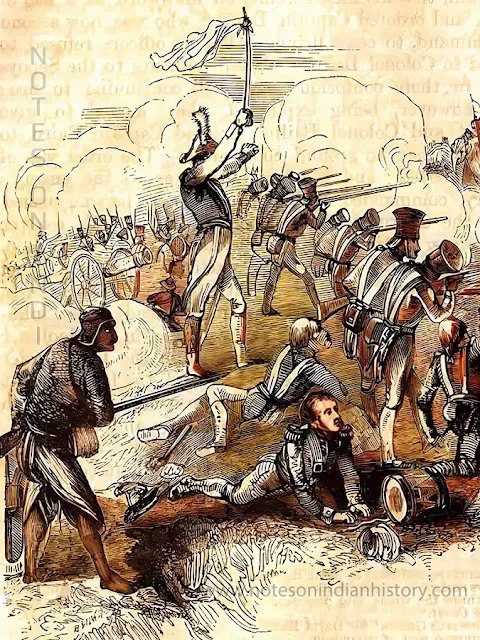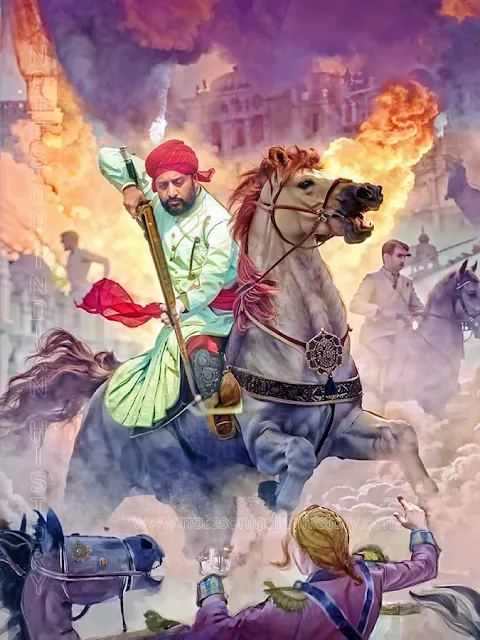True Account of Baillie's Disaster at Pullalur in 1780, the Worst British Defeat in India - Part 3
Welcome to the third part of the Battle of Pollilur series. Feel free to check out the previous parts: Part One and Part Two.
Baillie had ordered his troops to sit down. As the Mysore troops pressed closer and closer, the pressure on the rear appeared to be most severe, prompting Colonel Fletcher to order a company of European grenadiers to move to its support. He called out, "Come this way, grenadiers." Although he quickly specified that only Captain Ferrier's Company should come, the sepoy grenadiers rose in alarm and followed the European grenadiers in great disorder to the rear, believing it was a retreat.
The European grenadiers were eventually stopped, but the sepoys could not be controlled. The remaining sepoys, who were under heavy cannon fire, upon observing the confusion and retreat of their companions, became suddenly panic-struck, thrown away their arms, took off their uniforms, and fled to a nearby copse of trees.
A brief flashback to September 8th: In order to cut off Fletcher's detachment on their way to Baillie, Hyder had set up ambushes at various points along the direct route to Perambakam. The arrangements of this ambush were entrusted to Biccaji Scindia, one of Hyder's most trusted officers, who commanded a dusta or 1,000 cavalry.
Hyder, much incensed by the junction of Fletcher with Baillie had publicly disgraced Biccaji. Biccaji was waiting for an opportunity to regain his honor.
Biccaji, noticing the confusion among the sepoys in the present moment, charged them desperately leading his cavalry.
"Such a moving world advancing upon us, and no ammunition to our guns to keep them off, completed the disorder of the Sepoys." (An officer)
In the end, Biccaji perished with fifteen of his family members. Colonel Fletcher, Biccaji's adversary, also fought valiantly and fell around the same time.
"In spite of the smart firing that was kept up by the troops then in order, the enemy kept pressing forward. All was confusion." (An officer)
Baillie was convinced that the longer he could withstand the enemy's attacks, the more time it would give General Munro to come to his assistance. He even opened up his money chest and emptied all the cash onto the ground, shouting that the longer they held out, the more money would be theirs.
The explosion of the tumbrils had left the British artillery useless. Ammunition was giving out, and their only remaining weapons were their bayonets.
"The enemy's cannon were so heavy and numerous that even had we ammunition, our small field-pieces could do very little against them." (An officer)
The Mysore troops surrounded them from all sides and ultimately crushed their last attempts of resistance.
"As the men's ammunition was now mostly expended, the horse rushed frequently on their bayonets. In one of these attempts, two horsemen seized upon Colonel Baillie, but his life was saved by his Brigade-Major, Mr. Fraser, declaring to them who he was, and beseeching them not to kill him. This was instantly reported to Hyder, and he immediately ordered the slaughter to cease." (Lord Macleod)
However, some of Baillie's troops, escaping from the shattered square, climbed the nearby Pagoda and from there, they continued to fire upon Hyder's troops even after surrendering. Hyder took this as breach of surrender. Whereupon the Mysore cavalry rushed in and a horrible massacre of the defenseless men followed.
"Colonel Baillie after making every effort to save us, perceiving all was lost, and that it was his duty to save as many of the lives of his people as he could, held up a white flag for quarter. At this moment the horse were almost upon the point of the bayonets, but pulled up on perceiving the white flag. The enemy pointed to a smart firing which was kept up by our people towards the rear. Colonel Baillie sent orders to throw down their arms, but the firing continuing, the horse cut in." (An officer)
The few officers and soldiers were saved by the French officers in the Mysore service, Monsieur Lally and Monsieur Pimorin.
According to villagers, in the years following the battle, sovereigns were found so often that a legend emerged claiming they were actually fired out of English soldiers' muskets when they ran out of bullets.
Following the victory, Hyder established his camp at Damal, approximately 5-6 miles away from the battlefield. He directed his men to bring the prisoners and heads of the slain before him. Hyder rewarded ten rupees per live captive and five rupees per head.
The wounded Colonel Baillie was brought before Hyder on a cannon. "While these unfortunate gentlemen lay on the ground in the open air, at Hyder Ali's feet, heads of their unfortunate friends were, from time to time, presented to the conqueror, some of them even by English officers, who were forced to perform this inhuman service." (Colonel Bowser)
However, when Hyder Ali saw the suffering of the British officers upon witnessing this shocking scene, he ordered the practice to be discontinued.
Hyder afterwards provided Baillie one thousand rupees for the use of all the prisoners, along with some clothing.
Among the other British prisoners sent to Srirangapatna were Captain Baird, later known as General David Baird.
Baillie was confined in a dungeon at Srirangapatna, where he passed away on November 13, 1782.
On September 10, Munro wake up around 6.15 am hearing the cannonade between Baillie and Tipu.
Baillie had ordered his troops to sit down. As the Mysore troops pressed closer and closer, the pressure on the rear appeared to be most severe, prompting Colonel Fletcher to order a company of European grenadiers to move to its support. He called out, "Come this way, grenadiers." Although he quickly specified that only Captain Ferrier's Company should come, the sepoy grenadiers rose in alarm and followed the European grenadiers in great disorder to the rear, believing it was a retreat.
The European grenadiers were eventually stopped, but the sepoys could not be controlled. The remaining sepoys, who were under heavy cannon fire, upon observing the confusion and retreat of their companions, became suddenly panic-struck, thrown away their arms, took off their uniforms, and fled to a nearby copse of trees.
A brief flashback to September 8th: In order to cut off Fletcher's detachment on their way to Baillie, Hyder had set up ambushes at various points along the direct route to Perambakam. The arrangements of this ambush were entrusted to Biccaji Scindia, one of Hyder's most trusted officers, who commanded a dusta or 1,000 cavalry.
Hyder, much incensed by the junction of Fletcher with Baillie had publicly disgraced Biccaji. Biccaji was waiting for an opportunity to regain his honor.
Biccaji, noticing the confusion among the sepoys in the present moment, charged them desperately leading his cavalry.
"Such a moving world advancing upon us, and no ammunition to our guns to keep them off, completed the disorder of the Sepoys." (An officer)
In the end, Biccaji perished with fifteen of his family members. Colonel Fletcher, Biccaji's adversary, also fought valiantly and fell around the same time.
Baillie's Last Stand
Baillie, though much wounded, rallied the remains of his army, which now consisted of only four to five hundred Europeans, and took up his last stand by forming a new square on a rising ground to the southwest of Pullalur."In spite of the smart firing that was kept up by the troops then in order, the enemy kept pressing forward. All was confusion." (An officer)
Baillie was convinced that the longer he could withstand the enemy's attacks, the more time it would give General Munro to come to his assistance. He even opened up his money chest and emptied all the cash onto the ground, shouting that the longer they held out, the more money would be theirs.
The explosion of the tumbrils had left the British artillery useless. Ammunition was giving out, and their only remaining weapons were their bayonets.
"The enemy's cannon were so heavy and numerous that even had we ammunition, our small field-pieces could do very little against them." (An officer)
The Mysore troops surrounded them from all sides and ultimately crushed their last attempts of resistance.
Surrender of Colonel Baillie
Finally, Colonel Baillie, realizing that there was no hope of assistance from General Munro, raised a white handkerchief to his sword as a sign of surrender and ordered his men to lay down their arms. |
| Colonel Baillie waving a flag of truce at the Battle of Pollilur in 1780 after defeat by Hyder Ali - Illustration by Benwell |
"As the men's ammunition was now mostly expended, the horse rushed frequently on their bayonets. In one of these attempts, two horsemen seized upon Colonel Baillie, but his life was saved by his Brigade-Major, Mr. Fraser, declaring to them who he was, and beseeching them not to kill him. This was instantly reported to Hyder, and he immediately ordered the slaughter to cease." (Lord Macleod)
However, some of Baillie's troops, escaping from the shattered square, climbed the nearby Pagoda and from there, they continued to fire upon Hyder's troops even after surrendering. Hyder took this as breach of surrender. Whereupon the Mysore cavalry rushed in and a horrible massacre of the defenseless men followed.
"Colonel Baillie after making every effort to save us, perceiving all was lost, and that it was his duty to save as many of the lives of his people as he could, held up a white flag for quarter. At this moment the horse were almost upon the point of the bayonets, but pulled up on perceiving the white flag. The enemy pointed to a smart firing which was kept up by our people towards the rear. Colonel Baillie sent orders to throw down their arms, but the firing continuing, the horse cut in." (An officer)
The few officers and soldiers were saved by the French officers in the Mysore service, Monsieur Lally and Monsieur Pimorin.
According to villagers, in the years following the battle, sovereigns were found so often that a legend emerged claiming they were actually fired out of English soldiers' muskets when they ran out of bullets.
Prisoners of War
Out of the 86 officers in Baillie's column, 36 were killed or died from their wounds, including Colonel Fletcher and Captain Rumley. 34 were captured wounded, and 16 were taken unharmed. The whole sepoy forces were either killed, captured or scattered, leaving about 200 European soldiers as captives.Following the victory, Hyder established his camp at Damal, approximately 5-6 miles away from the battlefield. He directed his men to bring the prisoners and heads of the slain before him. Hyder rewarded ten rupees per live captive and five rupees per head.
The wounded Colonel Baillie was brought before Hyder on a cannon. "While these unfortunate gentlemen lay on the ground in the open air, at Hyder Ali's feet, heads of their unfortunate friends were, from time to time, presented to the conqueror, some of them even by English officers, who were forced to perform this inhuman service." (Colonel Bowser)
However, when Hyder Ali saw the suffering of the British officers upon witnessing this shocking scene, he ordered the practice to be discontinued.
Hyder afterwards provided Baillie one thousand rupees for the use of all the prisoners, along with some clothing.
Among the other British prisoners sent to Srirangapatna were Captain Baird, later known as General David Baird.
Baillie was confined in a dungeon at Srirangapatna, where he passed away on November 13, 1782.
What Happened to Munro?
Sir Hector Munro was the victor at Buxar in 1764 who defeated the combined armies of Mir Qasim, the Nawab of Bengal, Shuja-ud-Daula, the Nawab of Oudh, and Mughal Emperor Shah Alam II.On September 10, Munro wake up around 6.15 am hearing the cannonade between Baillie and Tipu.
(to be continued)


Comments